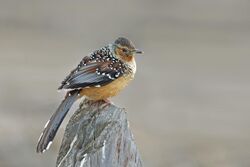Biology:Ianthocincla
From HandWiki
Short description: Genus of birds in the family Leiothrichidae
| Ianthocincla | |
|---|---|

| |
| Giant laughingthrush, (Ianthocincla maxima) | |
| Scientific classification | |
| Script error: No such module "Taxobox ranks".: | Animalia |
| Script error: No such module "Taxobox ranks".: | Chordata |
| Script error: No such module "Taxobox ranks".: | Aves |
| Script error: No such module "Taxobox ranks".: | Passeriformes |
| Script error: No such module "Taxobox ranks".: | Leiothrichidae |
| Script error: No such module "Taxobox ranks".: | Ianthocincla Gould, 1835 |
| Type species | |
| Cinclosoma ocellatum Vigors, 1831
| |
| Species | |
|
See text | |
Ianthocincla is a genus of passerine birds in the family Leiothrichidae.
Taxonomy
The genus Ianthocincla was erected by English ornithologist and bird artist John Gould in 1835 with the spotted laughingthrush as the type species.[1][2] The name of the genus combines the Ancient Greek ionthos "young hair" or "down" with the Neo-Latin cinclus "thrush".[3] The species now placed in the genus were previously assigned to Garrulax but following the publication of a molecular phylogenetic study in 2018, Garrulax was split up and some of the species were moved to the resurrected genus Ianthocincla.[4][5]
Species
The genus contains eight species:[5]
| Image | Common Name | Scientific name | Distribution |
|---|---|---|---|
 |
Spotted laughingthrush | Ianthocincla ocellata | Bhutan, China, India, Myanmar, and Nepal. |
 |
Giant laughingthrush | Ianthocincla maxima | central China and far northern India and Myanmar. |
 |
Barred laughingthrush | Ianthocincla lunulata | central China |
| White-speckled laughingthrush | Ianthocincla bieti | China | |
| Snowy-cheeked laughingthrush | Ianthocincla sukatschewi | northern China | |
| Moustached laughingthrush | Ianthocincla cineracea | China, India, and Myanmar | |
 |
Rufous-chinned laughingthrush | Ianthocincla rufogularis | Sikkim in northeast India |
| Chestnut-eared laughingthrush | Ianthocincla konkakinhensis | Vietnam |
References
- ↑ Gould, John (1835). "Specimens were exhibited of numerous thrushes". Proceedings of the Zoological Society of London Part 3: 47–48. https://biodiversitylibrary.org/page/30568556.
- ↑ Mayr, Ernst; Paynter, Raymond A. Jr, eds (1964). Check-list of Birds of the World. 10. Cambridge, Massachusetts: Museum of Comparative Zoology. p. 348. https://biodiversitylibrary.org/page/14486537.
- ↑ Jobling, J.A. (2018). "Key to Scientific Names in Ornithology". in del Hoyo, J.; Elliott, A.; Sargatal, J. et al.. Handbook of the Birds of the World Alive. Lynx Edicions. https://www.hbw.com/dictionary/definition/ianthocincla. Retrieved 19 January 2019.
- ↑ Cibois, A.; Gelang, M.; Alström, P.; Pasquet, E.; Fjeldså, J.; Ericson, P.G.P.; Olsson, U. (2018). "Comprehensive phylogeny of the laughingthrushes and allies (Aves, Leiothrichidae) and a proposal for a revised taxonomy". Zoologica Scripta 47 (4): 428–440. doi:10.1111/zsc.12296.
- ↑ 5.0 5.1 Gill, Frank; Donsker, David, eds (2019). "Laughingthrushes and allies". World Bird List Version 9.1. International Ornithologists' Union. http://www.worldbirdnames.org/bow/laughingthrushes/. Retrieved 17 January 2019.
- Collar, N. J. & Robson, C. 2007. Family Timaliidae (Babblers) pp. 70 – 291 in; del Hoyo, J., Elliott, A. & Christie, D.A. eds. Handbook of the Birds of the World, Vol. 12. Picathartes to Tits and Chickadees. Lynx Edicions, Barcelona.
Wikidata ☰ Q31843655 entry
 |
